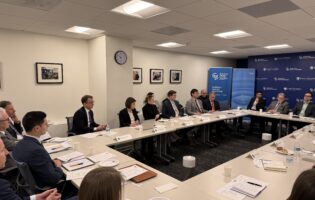Governing Global Financial Markets after the Crisis of 2007-2009
On November 3, 2016, AGI hosted a seminar on “Governing Global Financial Markets after the Crisis of 2007-2009” with DAAD/AGI Research Fellow Vincent Dreher. He focused on the international regulatory initiative to govern global financial markets after the crisis of 2007-09, which was comparable in scale and severity to the crisis preceding the Great Depression of the 1930s. A new G20 initiative aims to build a stronger framework to maintain openness of the global financial system.
Since the crisis, there has been a variety of outcomes achieved by the international regulatory bodies within the explanatory framework of international political economy. By looking at financial regulation at an international level and the Policy Entrepreneurs (PEs) behind these reform initiatives, we see that an internationally-oriented PE either supports reform initiatives with intense state support because of vulnerability at home or with diffuse state support because of general concern. Within the regulatory architecture these two types of PEs address two different types of international institutions: rigid institutions hinder or block reform initiatives, while opportunity structure allows the further completion of reform initiatives. The contingency table for PEs and regulatory architecture allows assessing and explaining four varying outcomes. In his talk, Mr. Dreher focused on Basel III, the capital surcharge, and total loss absorbing capacity (TLAC) negotiations.
Looking at bank regulations, a first step is to analyze and compare which countries are vulnerable to big banks and their preference for international regulations. The analysis’ crude measure is to compare Global Systemically Important Bank (G-SIB) balance sheets and the GDP of the home country. The two main targets identified as vulnerable to large bank turmoil were the UK and Switzerland. The second step is to determine preferences for capital, the capital a bank needs to be stable, and also to answer the question of what countries prefer which instruments to be included in international capital requirements. For the analysis of the financial crisis, one has to keep in mind the differentiation of rigid international institutions, like the Basel Committee for Banking Supervision (BCBS), or institutions with an opportunity structure, like the Financial Stability Board (FSB).
After a brief review of Basel I and Basel II, the focus was put on Basel III regulations of September 2010 and June 2011. Applying Basel III and the proposal of the BCBS technical team in 2010 to the theoretical framework, one would expect the outcome to fall short of the PEs goal and the PE would be resource-rich, but within a rigid institution. In 2011, regulators came together to decide on higher global systematically important bank capital standards for the biggest banks, as identified by the FSB. At last, the FSB Total Loss Absorbing Capacity was developed in 2015, and in tune with the theoretical framework the initiative was found to be the second-best option the UK had to make its own banks more stable while maintaining their international competitiveness.
In closing, Mr. Dreher focused on the implications for international cooperation over cross-border financial regulation and found that (1) international regulatory policy change is possible, (2) change necessitates decisive policy entrepreneurs, ample resources provided by home institutions, and a supportive opportunity structure, as well as (3) that a lack of these factors results in symbolic politics, inconsequential expert recommendations, and an increasingly unleveled global playing field. He finished his talk by further illustrating the implications for Eastern Asia, for the United States, and for Europe.
Vincent Dreher is a DAAD/AGI Research Fellow from September through November 2016. He is a Research Associate at the Center for International Political Economy at the Free University Berlin. Previously, he was a PhD Candidate at the Berlin Graduate School for Transnational Studies. Mr. Dreher holds a Master’s degree in International Relations from Free University Berlin, Humboldt University Berlin, and University of Potsdam, and a Graduate Diploma in Economics from the University of Essex.
Location
AICGS R. G. Livingston Conference Room
1755 Massachusetts Ave NW Suite 700 Washington, DC 20036 United States







